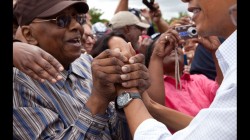 Whatever jobs plan President Obama unveils tonight (7 p.m. ET) when he addresses Congress and the nation, it will face a tough, uphill battle to be successful, and not just because of a skeptical, combative Republican House.
Whatever jobs plan President Obama unveils tonight (7 p.m. ET) when he addresses Congress and the nation, it will face a tough, uphill battle to be successful, and not just because of a skeptical, combative Republican House.
Not since Franklin Roosevelt has a presidential speech to a joint session of the House and Senate on the economy had any effect, regardless of the boldness of the plan or its details.
“It is impossible to trace any recovery to the presidential proposals in almost every case,” says 24/7 Wall St., a financial news and analysis site that conducted a review of presidential speeches to joint sessions since the end of the Great Depression. 24/7 found seven speeches dealing with business and economic issues and concluded “they had virtually no effect on the economy, despite the detailed proposals.”
That alone is bad mojo for a president who needs to hit a homerun. But as hints about what Obama’s plan will contain began to leak, economists were already expressing mixed opinions about some of the proposals, especially the hiring tax credit. It’s not certain that will be part of the plan; presuming it will be, however, economists were divided about the effect tax credits or exemptions have in spurring hiring.
Last year’s HIRE Act exempted companies from paying payroll tax on every unemployed person they hired. That was an immediate 6.2 percent break (on the individual’s salary). If the person stayed on the payroll for a year, the company also got a $1,000 tax credit.
To some extent, the HIRE Act worked in getting companies to hire the unemployed. The U.S. Treasury Department said in July 2010 that businesses hired some 4.5 million qualified unemployed in the first few months. But Alan Krueger, then the Treasury Department’s chief economist and now the President’s nominee to be chairman of the White House Council of Economic Advisers, cautioned about attributing the hiring to the Act.
Other economists are much more enthusiastic about payroll tax cuts as a hiring incentive. “By extending the payroll tax cut — and the provision of additional weeks of unemployment benefits to workers who have exhausted their 26 weeks of state-funded UI benefits without finding a job — policymakers can avoid increasing the risk of renewed recession,” the Center on Budget and Policy Priorities wrote in a blog post.
Extending unemployment benefits is expected to be another component of the President’s plan. Extended benefits are due to expire at year’s end unless Congress renews funding. Currently, more than 6 million Americans have been out of work for more than 6 months.
This morning, the Labor Department reported that initial claims for unemployment rose by 2,000 last week to 414,000. Economists had expected a decline. The report also said that almost 3.6 million workers were receiving emergency or extended unemployment benefits.
Without again extending federal unemployment aid, many economists caution that the conditions could worsen, especially in areas where falling real estate prices have left owners underwater on their mortgage. Without extended benefits to prop them up, more homeowners are likely to walk away from their mortgage.
Of course, as with everything, there are those who believe that extending benefits discourages job seeking.
As a final example of the challenges Obama faces some Republicans are threatening to boycott his speech. Enough have announced they’ll be elsewhere tonight that House Speaker John Boehner scolded his fellow Republicans for being discourteous. “We ought to be respectful, and we ought to welcome him.”
If you have questions about the plan, the White House is assembling a panel of Administration economic experts to answer them. You can tweet your question (using #WHChat), or post to the White House Facebook page or via this form.